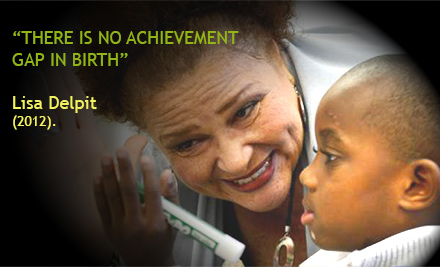 |
| Lisa Delpit |
So of course I struggled like insanely with this reading. I'm assuming this was most likely because of the length. Long readings intimidate me and I tend to get lost in them. But just like with the Delpit reading I was able to get through it and I believe get the author's main point out of it.
So as we all know, Lisa Delpit's argument is that teachers must explicitly state these rules and codes of power when in a classroom. This is because not every child will learn these rules in their homes and without knowing the rules and codes a child will never actually succeed in school.
Within Finn's article we can see this same beliefs system emerging. Finn states, "I didn't say to an errant student, 'What are you doing?' I said, 'Stop that and get to work.' No discussions. No openings for an argument." This is dialogue that would Delpit would be thrilled with. When Finn is interacting with his students he doesn't beat around the bush and give them the opportunity to answer questions and sort of defend their actions.
If Finn saw a child not doing what they were supposed to be doing he was explicit with them, much like Delpit would be. He quickly addresses the situation and tells that child what he or she should be doing at that point in time. This leaves the child with clear directions instead of an open ended question that he or she might not understand.
Although Finn states that he felt "controlling" over his classroom, that was exactly what needed to happen. Finn says the he knew those children needed an authoritative figure. This was obvious because otherwise, those kids would have walked all over him. Finn being controlling and explicitly stating to his students what he expected of them was a way to make sure that the students stayed obedient and that actual learning got done in the classroom.
So there ya have it, my connections post ! Below I've included a link to Finn's website for Literacy With an Attitude, check it out if you'd like ! Thanks for reading this week !
Literacy With and Attitude








